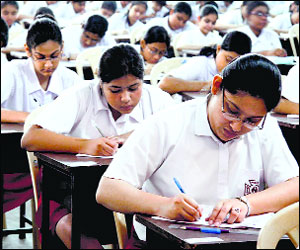 Bangalore, Jun 15: The precision associated with mathematics is not a virtue of the new Class X mathematics textbook of State Syllabus.
Bangalore, Jun 15: The precision associated with mathematics is not a virtue of the new Class X mathematics textbook of State Syllabus.
Almost every chapter in the new textbook is riddled with errors. Mathematics teachers and officials in the State Education Department have spotted these mistakes. The revised textbook, which is supposed to conform to CBSE standards, has already been distributed to students across the State.
Mohammed Mohsin, Commissioner, Department of Public Instruction that he has received complaints regarding these errors. “The Textbook Society has given a brief review on the mistakes spotted. A senior person from the Maths Textbook Framing Committee has been asked to look into them. Based on the errors that have been spotted, we will issue a corrigendum to schools,” he said.
Sources in the State Education Department raised doubts about the efficiency of the officials monitoring the textbook. They also said there is a shortage of officials in the Directorate of Secondary Education and Research Training to screen the textbooks.
Pointing out that there are around 300 errors in the revised textbook, J?K?Gangadhar Rao, senior mathematics teacher at Bangalore Higher Secondary School, told Deccan Herald: “We have found mistakes in many chapters. There is also lot of unnecessary information that leads to confusion.”
Going into the specifics of inaccuracies, Rao pointed out that in the first chapter of geometry, in exercise 10.1, there are three problems that cannot be solved. In one problem, wherein students are asked to find the value of “xy”, finding the value of “x” is not possible. Also, in the same exercise, there is a problem involving a 6-cm ladder. That is too small a measurement to be considered, he said.
The maximum number of errors, teachers claim, are in the geometry section. “In the very first chapter itself, there are a few mistakes,” said Malathi, a mathematics teacher from a private school in the City.
Moreover, teachers also claim there is not enough clarity in the concepts given. “Similar problems were encountered in the Class IX textbook. Sometimes, it leaves us wondering whether we have understood the concepts properly,” she said.
Nagasimha G?Rao, a child rights activist, said he had received several calls in this regard. “The suggested changes would be sent to the authorities concerned after other subject textbooks are screened as well. We have teachers calling us and saying they are finding it tough to cope with the new syllabus. Sometimes, a situation might arise where they cannot even be vocal about it,” he said.
Rao also said there was a need to follow procedures while introducing a new textbook.







Comments
Add new comment